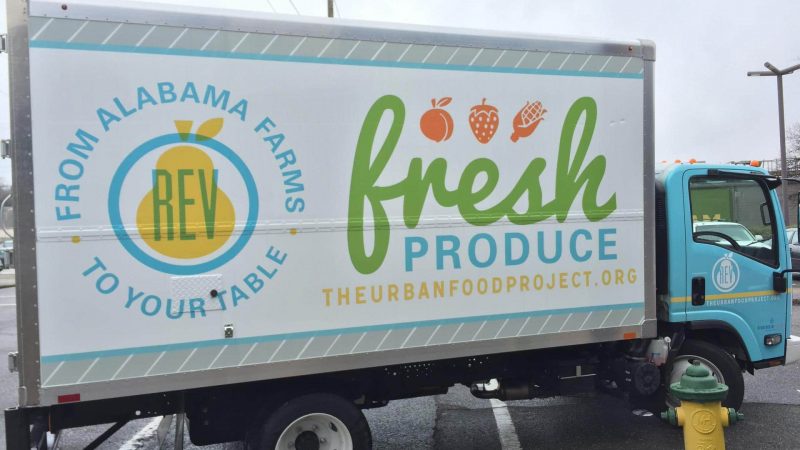Urban Food Project Brings Fresh Produce To Corner Stores
SAM, REV Birmingham's new food delivery truck is pictured here parked outside of The Urban Food Project's hub in preparation for the day's deliveries.
For some who live in Birmingham, it is easy to get healthy food, especially if you have a car and can drive to a large grocery store. But if you are one of the 88,000 people living in one of Birmingham’s food deserts, getting quality food can be a real challenge. A local revitalization organization, REV Birmingham, is working to change that through an initiative called the Urban Food Project.
So what exactly is a food desert? According to Amy Badham, an instructor at the UAB Ryals School of Public Health, “a food desert is simply an area where there’s a lack of access to healthy food.”
“While there might be a convenience store and fast food restaurants, there aren’t going to be grocery stores that stock fresh produce and other things that constitute a healthy diet,” explains Badham.
Food deserts are common in large urban areas, and Birmingham is no exception. REV has been analyzing Birmingham’s food deserts for years, and through Urban Food Project, folks at REV are working to stock corner stores in some of Birmingham’s food deserts with fresh, affordable produce.
Ever since Vacca City Drugs in Gate City partnered with REV’s Urban Food Project (UFP), it seems like the folks at Vacca are consistently happy to see Raghella Scavuzzo, the Farm-to-Corner Store Coordinator for the UFP—that’s because she always brings a variety of fresh, tasty, Vacca-specific produce with her.
“It has been very positive; we’ve had a good turn-around on it, ” says John Vacca, the owner of Vacca Drugs. Vacca was initially skeptical of selling REV-supplied produce. He worried the food would spoil on the shelves. But now he says he’s “moving a lot of products and getting positive feed back from the customers.”
Tanji Frost, a long-time customer turned Vacca employee, says the partnership has grown tremendously from its humble beginnings.
“We just had a little table at first,” says Frost. “Now we have a whole stand and a cooler in the back. And sometimes, we have more people come in for the fruits and vegetables than for the medicine.”
Frost said that there were many fruits and vegetables that the Vacca customers loved, but there was one in particular that got her very excited: The peaches.
“Every time she comes in with the peaches we have to get cases. We sell like three or four case. Like, we run out! Sometimes she has to make like an extra trip just to bring us peaches because we run out,” says Frost.
“The peaches, oh my god!”
Scavuzzo says the best part of her job is seeing the projects impact on those who regularly purchase the produce.
“One store, we started in in July, and at Thanksgiving, people were specifically asking me what’s going to be on sale, what produce are you going to have? I have to plan my thanksgiving meal around your vegetables,” says Scavuzzo. “Who could’ve imagined that a corner store could have enough stuff for them to make a Thanksgiving meal out of?”
Scavuzzo says the corner store shoppers tell her all the time how much easier it is to get food and vegetables now.
“I’ve had people tell me that this is the best placed thing that could’ve happened because they have to take two buses to go to Wal Mart, and to get fresh fruit and vegetables from Wal Mart is just too hard,” Scavuzzo says. “But now, they can come over to their store across the street, and they can buy all of their things. They like that store, they already shopped there, so it was really easy.”
The Urban Food Project cannot single-handedly cure Birmingham’s food desert problem, but its progress shows that there is a demand for fresh produce in Birmingham’s food deserts. Scavuzzo thinks that if more corner stores stock fresh produce, it will be good for their communities and their bottom lines.
Prediction market trader ‘Magamyman’ made $553,000 on death of Iran’s supreme leader
It's the latest trade drawing scrutiny on the popular prediction market site for appearing to show an insider making profits on military secrets.
Oil prices rise sharply in market trading after attacks in Middle East disrupt supply
The high prices came as U.S. and Israeli attacks on Iran and retaliatory strikes against Israel and U.S. military installations around the Gulf sent disruptions through the global energy supply chain.
Satellite images provide view inside Iran at war
Satellite images from commercial companies show the extent of U.S. and Israeli strikes, and how Iran is responding.
Mideast clashes breach Olympic truce as athletes gather for Winter Paralympic Games
Fighting intensified in the Middle East during the Olympic truce, in effect through March 15. Flights are being disrupted as athletes and families converge on Italy for the Winter Paralympics.
A U.S. scholarship thrills a teacher in India. Then came the soul-crushing questions
She was thrilled to become the first teacher from a government-sponsored school in India to get a Fulbright exchange award to learn from U.S. schools. People asked two questions that clouded her joy.
U.S.-Israeli strikes in Iran continue into 2nd day, as the region faces turmoil
Israel said on Sunday it had launched more attacks on Iran, while the Iranian government continued strikes on Israel and on U.S. targets in Gulf states, Iraq and Jordan.







